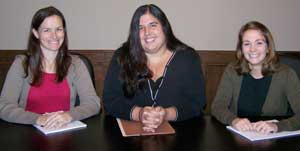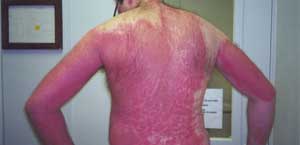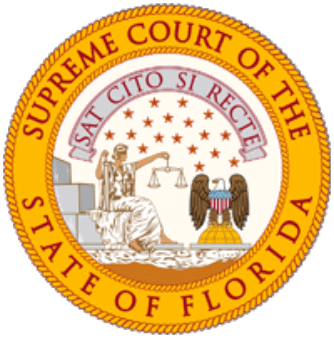
As an Equal Justice Works Fellow advocating for mentally ill prisoners, Cassandra Capobianco uncovered a startling overuse of tear gas and pepper spray in Florida prisons, resulting in serious burns to inmates already suffering from diagnosed psychiatric disorders.
“A lot of these clients were burned so badly they required extensive medical treatment,” said Capobianco, whose two-year EJW Fellowship at Florida Institutional Legal Services (FILS) was funded by The Florida Bar Foundation with support from the Advocacy Center (now Disability Rights Florida).
One prisoner, 38-year-old Jeremiah Thomas, a diagnosed schizophrenic, became the main plaintiff in a 2004 impact lawsuit against the Florida Department of Corrections (DOC) after he was severely burned and traumatized by chemical agents that had been used on him five times in six days. While in his isolation cell, Thomas was hit with so much pepper spray that he ended up with first- to third-degree burns on his back, abdomen, arms, elbows and buttocks.
“The Department of Corrections had a policy that non-spontaneous use of force had to be videotaped unless you were using chemical agents,” said FILS executive director Christopher Jones, explaining that the use of pepper spray and tear gas had come to replace brute force after the 1999 beating death of an inmate by corrections officers and subsequent scrutiny of the Florida DOC by federal authorities.

Thomas was one of 10 mentally ill inmates FILS attorneys originally represented in a case Jones said was aimed at stopping the “systematic torture” of severely mentally ill inmates with chemical agents while confined virtually 24 hours a day, seven days a week, in 9- by 7-foot isolation cells where they posed no threat to themselves or others.
After working the case for seven years, Capobianco was part of a litigation team, including the law firm of Holland & Knight and the Florida Justice Institute, that won the lawsuit. Four days before appellate oral arguments, Thomas — one of two remaining plaintiffs — died in custody. His father, still suspicious that his death could have been related to the repeated use of chemical agents, took some solace in the association of his name with a lawsuit that would bring change. The victory resulted in the rapid and steep decline of pepper spray and tear gas being used against mentally ill inmates.
Capobianco was also part of a team that litigated a separate lawsuit, which resulted in DOC hiring mental health staff to monitor mentally ill inmates in extended confinement. She is one of 68 EJW Fellows the Foundation has funded to work at 21 different Florida legal aid organizations since 1999, with a total investment since then of $2.7 million dollars. The mission of the Washington D.C.-based Equal Justice Works is to create a just society by mobilizing the next generation of lawyers committed to equal justice. In partnership with the Foundation, the law firm of Greenberg Traurig and The Florida Bar have consistently helped support EJW Fellows working at legal aid organizations providing assistance to low-income Floridians in areas such as health-care and immigration law and children’s rights.
Of all Foundation-funded EJW Fellows, 68 percent have remained in Florida and 81 percent remain in public interest law. FILS, where Capobianco completed her EJW Fellowship and where she continues her impact work today, is a prime example of how well the partnership has worked.
Four of FILS’ six current staff attorneys — Capobianco, Kristen Lentz, Andrea Costello and Katy DeBriere — were EJW fellows. Unfortunately, declining revenue from Florida’s Interest on Trust Accounts Program now limits the number of EJW fellows the Foundation can sponsor and also threatens the viability of some of the projects begun by the former EJW Fellows. The Foundation anticipates that it will have cut FILS’ grant to $296,000 by the 2014-15 grant year, a 71 percent drop from its $1 million grant in 2010-11.
Costello, who came to FILS after serving as an EJW fellow at Southern Legal Counsel in Gainesville, Fla., recently accepted another public interest job in Washington, D.C., where her career outlook is better. Highly specialized in Medicaid law, Costello will be hard to replace. Jones is not sure where he will find someone to carry on her project, which advanced the rights of people with physical disabilities so they could receive long-term, in-home healthcare and supportive services through Medicaid, rather than being institutionalized or put in nursing homes in violation of their rights under the Americans with Disabilities Act and federal Medicaid laws.
Costello’s EJW project resulted in significant reforms to the state’s policies and procedures for the Medicaid program that provides community-based services, including ensuring due process and a commitment from the state to put adequate funding into the program to meet the need.
“We have recruited and retained some of the best legal aid advocates in the country and now we are in a crisis where we may not be able to maintain their positions,” said Jones. “EJW Fellowships themselves are likewise no longer as readily available.”
Jones is hoping he will be able to hold onto the other former EJW Fellows whose projects — like Costello’s — have expanded the scope of FILS’ work. Once regarded as a “prison” legal aid program, FILS now offers legal services to other populations, such as the developmentally disabled and veterans. Jones cites Lentz’ work in Mobley v. Department of Veterans Affairs, which he said “improved the VA’s treatment of institutionalized and homebound veterans across America.”
Lentz came to FILS originally as an EJW Fellow who, like Capobianco, advocated for some of the most vulnerable people in the state; mentally ill people who were civilly committed. Her fellowship was co-sponsored by Miami attorney Bruce Rogow.
“I really think the Foundation and Equal Justice Works showed strength in supporting a project like that,” Lentz said. “My project focused on an unpopular population, but it impacted hundreds, if not thousands of people through litigation.”
DeBriere’s EJW project focused on trying to prevent the institutionalization and incarceration of people with physical and developmental disabilities by advocating for access to community-based services. She developed an 82-page handbook that provides insight on how defense attorneys can identify and communicate with their developmentally disabled clients, document their disabilities and seek special sentencing considerations.
Now as a FILS attorney, DeBriere focuses more on direct advocacy on behalf of the developmentally disabled who are at-risk or are already incarcerated or institutionalized. She has succeeded at diverting at-risk clients from the system by working together with law enforcement, the courts and the social support system.
“That is the reason my fellowship was started,” DeBriere said. “Getting everyone working together to get that person what they needed.”
Jones is hoping that the funding will be found to help his organization and others avoid the loss of such competent and committed lawyers and to seek new EJW fellows.
“Now more than ever we need to recruit and retain this caliber of advocate, but that is getting harder to do,” he said.




